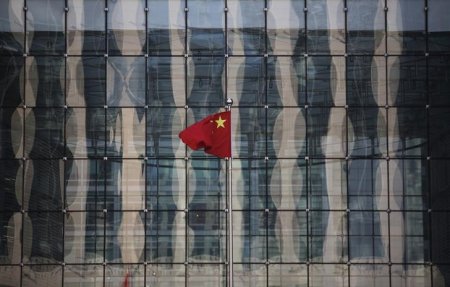 Thomson ReutersChinese national flag flutters at the headquarters of a commercial bank on a financial street near the headquarters of the People’s Bank of China, China’s central bank, in central Beijing
Thomson ReutersChinese national flag flutters at the headquarters of a commercial bank on a financial street near the headquarters of the People’s Bank of China, China’s central bank, in central Beijing
HONG KONG (Reuters) – After snapping up assets at a record pace so far this year, Chinese buyers are expected to hold back in the run-up to the U.S. presidential election in November, nervous that campaign rhetoric might invite closer regulatory scrutiny of deals.
Uncertainty about the ultimate winner could also give buyers pause, said lawyers and bankers, as the presumptive Republican nominee, Donald Trump, has regularly accused China of stealing U.S. jobs and manipulating its currency for unfair trade advantage.
“The identity, let alone the foreign policy of the incoming presidential candidate in the U.S., isn’t exactly clear, and it is fair to say there is considerable uncertainty about how that will play out in the China market,” said Andrew McGinty, a Shanghai-based partner at law firm Hogan Lovells International, who has advised on M&A in China for two decades.
Chinese foreign acquisitions this year have totaled $104 billion, close to the total announced last year, but there have also been a record nearly $27 billion of failed attempts, mostly in the United States, and mostly due to regulatory pushback. Figures for deals announced in March through May are already down from a peak in February.
The latest Chinese outbound deal to run into regulatory trouble is Anbang Insurance Group’s proposed $1.57 billion bid for U.S. peer Fidelity & Guaranty Life .
The New York regulator has asked Anbang to withdraw its application after it failed to provide information requested for processing the deal.
Any deal launched for a U.S. target now is unlikely to secure all the required regulatory clearances before the November election, and most buyers will think twice before launching sensitive deals during the most intense period of campaigning, bankers say.
“That will create a certain amount of uncertainty within Chinese buyers because people want to know, ‘Well, who is it going to be looking at my deals?’ especially if you consider the CFIUS aspect,” said McGinty, who has nearly two decades of experience in China.
The Committee on Foreign Investment in the United States (CFIUS), which reviews deals for potential national security threats, has emerged as a significant risk for Chinese companies making U.S. acquisitions. The United States is also seeking to broaden the committee’s powers.
HARD LINE
Some technology-related acquisitions from China have faced unexpected and intense CFIUS scrutiny, leading to some deals being pulled. In February, China state-backed Unisplendor Corp scrapped a $3.78 billion bid for Western Digital Corp after CFIUS said it would investigate the transaction.
“This (scrutiny) is not likely to decrease any time soon and may increase, at least in the short term, after a new president takes office,” said Anne Salladin, special counsel with Stroock & Stroock & Lavan LLP, who advises on CFIUS matters.
Trump has not made comments on Chinese acquisitions, but has called for 45 percent tariffs on imports from China. Chinese officials have generally avoided criticizing Trump directly, though they have disputed his claims.
A spokeswoman for Trump’s campaign did not respond to requests for comment.
Salladin said Trump has taken a hard line toward China and other countries during the Republican primary campaign, but noted that presidential candidates would often “move toward the center” during the campaign proper and might, if elected, govern differently from their campaign rhetoric.
“I think it’s too early to make any predictions at this point,” she added.
Another area of concern for some experts is how a new U.S. president would tackle the long-contentious subject of foreign currency. China and the United States have traded accusations of currency manipulation for years before Trump’s campaign chimed in.
“If that were to come back on the agenda, there could be some friction that would not be helpful for U.S.-China deal-making,” said McGinty.
But anti-China sentiment is unlikely to deter Chinese buyers in the longer term, said Alberto Forchielli, founder of China-focused private equity firm Mandarin Capital.
“Chinese investments in the U.S. will be less and less popular. It will be a more difficult business climate,” Forchielli said.
“Chinese corporates, however, are not worried about U.S. elections. They know that in an electoral year there is a phase of China bashing. They will continue to buy.”
(Additional reporting by Lisa Jucca, Tris Pan, Clare Jim in HONG KONG and Richard Valdmanis in WASHINGTON; Reporting by Denny Thomas; Editing by Will Waterman)
Read the original article on Reuters. Copyright 2016. Follow Reuters on Twitter.
More from Reuters:
- Brazil’s impeachment trial to run into Rio Olympics
- EU telecom regulators see free Internet services as next battle
- Sarepta says FDA asks for more data for its muscle-wasting treatment
- Genentech, OSI to pay $67 million over drug claims: U.S. Justice Dept
- Saudi reform plan aims for revenue surge, salary clamp-down













